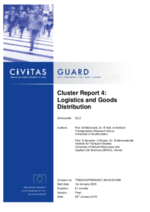Company mobility planning
Thematic areas
Behavioural change & mobility management
Summary
By drawing up mobility plans, companies can help their employees to opt for sustainable modes of transport rather than private cars for their work-related trips.
Implementing sustainable mobility
Among the objectives of the Urban Mobility Plan (Plan de Deplacements Urbains, or PDU), approved by Lille Metropole in 2000, are to reduce the number of private cars on the roads and to promote alternative modes such as public transportation, walking, cycling and car sharing.
Journeys between home and the workplace represent a significant share of traffic during peak hours, and employers can play an important role in encouraging their employees to choose more sustainable transport modes.
The Lille Metropole Authority (LMCU) took a leading role by implementing its own company mobility plan in 2002, in which it undertook to:
- improve pedestrian and bicycle routes to council offices;
- develop a car-sharing scheme; and
- provide financial incentives (50 percent of the cost of a transport season ticket paid by LMCU).
Progress
In the framework of CIVITAS TRENDSETTER, an internal study carried out by the Company Mobility Plan Study Group evaluated the travel habits of LMCU employees and potential change in travel habits.
On the basis of the mobility plan, four electric scooters and 23 bicycles were in use for the home to work journey, a car-sharing scheme was established for commuting, lunch break trips, and trips to external meetings or work-related social events.
Outcomes
By December 2004, some 244 LMCU employees had taken advantage of the offer to subsidise the purchase of public transport season tickets (to an amount of EUR 6,500):
- 123 subscriptions to the urban public transport network operated by Transpole;
- 113 subscriptions to the network of the national rail operator (SNCF) and regional train operator (TER); and
- 8 subscriptions to the Transpole network + TER (so-called Ticket Plus).
New behaviour was encouraged, and the use of bicycles rose. The car-sharing scheme attracted relatively less interest, due to the modal shift towards public transportation.
Based on the LMCU initiative, a number of other administrative authorities and private companies in the region were inspired to implement similar measures. In 2004, there were more than 600 subscribers to the network of public transport operator Transpole out of a total staff of almost 5,000. Employees are also able to benefit from subsidised fares for the use of park and ride facilities.








